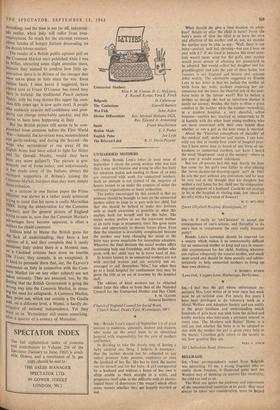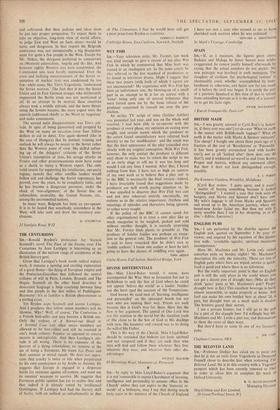BELGRADE
Sta,—Your correspondent's report from Belgrade was interesting. To me, a young Yugoslav who re- cently chose freedom, it illustrated quite well the Western way of thinking on matters like neutrality, the cold war and so on.
The West can ignore the existence and importance of the uncommitted countries at its peril : they must always be taken into consideration, must be helped
and cultivated. But their policies and ideas must be put into proper perspective. To expect them to take an objective, long-term view of world affairs, to judge East and West on facts alone—would be naive and dangerous. In that respect the Belgrade conference was, not unexpectedly, a big disappoint- ment for quite a few people in the West. Except for Mr. Nehru, the delegates preferred to concentrate on (Western) colonialism, Angola and the like. And however rightly Western sins were condemned, the Communist sins were hardly mentioned. Even the crass and bullying announcement of the Soviet re- sumption of nuclear tests was condemned by too few; while some, like Tito's Yugoslavia, 'understood the Soviet motives.' The fact that it was the Soviet Union and its East German stooges who deliberately engineered the Berlin crisis was not mentioned at all. In an attempt to be neutral, these countries always took a middle attitude, and the more threat- ening the Soviets became, the more urgent were the appeals (addressed chiefly to the West) to 'negotiate' and make concessions.
The second main disappointment was Tito's atti- tude. In spite of being glamorised and propped by the West on many an occasion. (over four billion dollars in aid to date), Tito again showed (like in the case of Hungary) that by instinct, training and outlook he will always be nearer to the Soviet rather than the Western point of view. His skilful soften- ing up of the delegates' criticism of the Soviet Union's resumption of tests, his savage attacks on France and other pronouncements must have come as a shock to many a Western expert. The only valid reason for supporting his totalitarian, one-party regime, namely that other satellite leaders would follow suit and challenge the Soviet supremacy, has proved, over the years, to be completely futile, and he has become a dangerous purveyor, under the cloak of 'non-alignment,' of the Soviet line on colonialism, neutrality, the United Nations, etc., among the uncommitted nations.
In many ways, Belgrade has been an eye-opener. It is to be hoped that somebody, somewhere in the West, will take note and draw the necessary con- clusions.



































 Previous page
Previous page